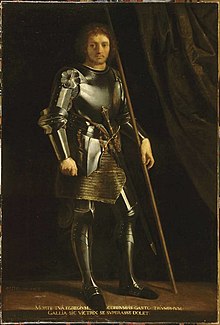Gaston de Foix (Nemours)
Gaston de Foix, Duke of Nemours (born December 10, 1489 in Mazères , † April 11, 1512 near Ravenna ) was a French military man who was known for his brilliant six-month campaign in the War of the League of Cambrai in 1511/1512 .
Life
He was the son of Jean de Foix , Vice Count of Narbonne from the House of Grailly , and Marie d'Orléans. His paternal grandparents were Gaston IV , Count of Foix and Eleanor , Queen of Navarre . His maternal grandparents were Karl, Duke of Orléans and Maria von Kleve . King Ludwig XII. was thus his uncle. He became Duke of Nemours and Peer of France on November 19, 1507 (appointment) and January 14, 1508 (registration). In addition, he was governor of the Dauphiné and Count of Beaufort and Étampes .
Gaston's campaign

In 1511, at the age of 21, Gaston came to Italy as the new military commander and governor of Milan . His presence and energy gave the conflict a new dynamic.
The French forces had captured Bologna on May 13, 1511, but now saw them besieged by the combined Spanish-papal troops and Ramón de Cardona , the Spanish viceroy of Naples . Gaston led his army to Bologna and crushed the army of the Holy League . He then turned north and defeated the Venetians at Brescia , which the French later conquered in February 1512.
By March 1512, Gaston had firmly established French control of northern Italy. Now he let his troops march south to besiege Ravenna and force the Spaniards to battle. Cardona carefully led the Spanish papal army to the French lines in order to obtain a better defensive position. Gaston had 23,000 soldiers, including 8,500 German mercenaries , and 54 cannons. Cardona had around 16,000 soldiers and 30 cannons under his command. In addition, there was the garrison of Ravenna with around 5000 men. Gaston sent Cardona a formal invitation to battle, which Cardona accepted.
The decisive battle of Ravenna took place on April 11, 1512. The French casualties at the end of the day amounted to 9,000 men, while the Spanish had lost almost the entire army. For the French, however, more important than the victory was that Gaston de Foix, who had shown incredible military talent over the past few months, was shot dead in a cavalry attack led by him.
His tomb in the Castello Sforzesco in Milan was designed by the Italian Agostino Busti .
See also
Web links
literature
- Trevor N. Dupuy : Harper Encyclopedia of Military History. HarperCollins, New York 1993, ISBN 0-06-270056-1 .
- John Julius Norwich: A History of Venice . Vintage Books, New York 1989, ISBN 0-679-72197-5 .
- Frederick Lewis Taylor: The Art of War in Italy, 1494-1529 . Greenwood Press, Westport 1973, ISBN 0-8371-5025-6 .
- Frederic J. Baumgartner: Louis XII . St Martin's Press, New York 1996, ISBN 0-312-12072-9 .
| personal data | |
|---|---|
| SURNAME | Foix, Gaston de |
| ALTERNATIVE NAMES | Gaston de Foix, duc de Nemours |
| BRIEF DESCRIPTION | French military commander in chief |
| DATE OF BIRTH | December 10, 1489 |
| PLACE OF BIRTH | Mazères |
| DATE OF DEATH | April 11, 1512 |
| Place of death | Ravenna |


